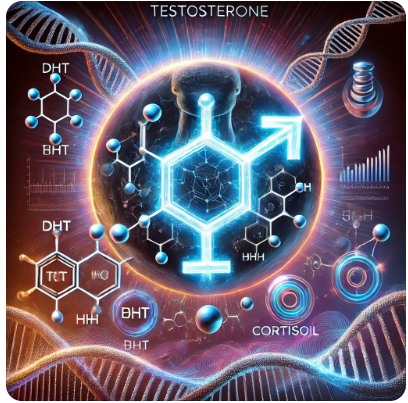Welcome to Your Journey Towards Hormonal Balance - Testosterone
Understanding the Importance of Testosterone and Hormonal Health
As men age, particularly those over 40, maintaining optimal health becomes increasingly vital. One of the key aspects of men’s health that often goes overlooked is testosterone and hormonal balance. This module is designed to provide you with valuable insights into how testosterone levels affect your overall well-being and what steps you can take to achieve hormonal stability.
Testosterone plays a crucial role in various bodily functions, including muscle mass, bone density, mood regulation, and libido. Yet, as men age, testosterone levels naturally decline, which can lead to a range of health concerns. From fatigue and decreased motivation to weight gain and emotional ups and downs, the impact of hormonal imbalance can significantly affect your quality of life.
Our goal in this module is to equip you with the knowledge and strategies needed to understand and manage your testosterone levels effectively. You will learn about the signs and symptoms of low testosterone, the factors that influence hormonal balance, and practical solutions to enhance your health. By the end of this module, you will be empowered to take actionable steps towards achieving hormonal balance and improving your overall wellness.
What You Will Get Out of this Module
By the end of this module, you will:
- Understand the critical role testosterone plays in men's physical, cognitive, and emotional health, especially after age 40.
- Identify common symptoms and impacts of low testosterone, including effects on energy, muscle mass, sexual health, mood, and cognition.
- Learn how to effectively test and interpret hormonal health markers to accurately assess testosterone levels and overall hormonal balance.
- Discover natural, evidence-based methods to optimize testosterone production through diet, targeted exercise, improved sleep, and stress management.
- Explore medical interventions such as Testosterone Replacement Therapy (TRT) and alternative treatments, understanding when and how to safely pursue them.
- Gain practical strategies to maintain long-term hormonal balance and vitality, leading to enhanced overall health and quality of life.
Introduction to Testosterone and Hormonal Health
Testosterone is the primary male sex hormone and an essential component of men’s health. In this section we introduce the basics of testosterone production, its role in the body, and why maintaining optimal levels is crucial, especially for men after the age of 40.
What is Testosterone?
Testosterone is a hormone primarily produced in the testes. Testosterone regulates several functions, including muscle growth, fat metabolism, libido, and overall energy levels.
Think of your body like a well-organized communication system where different parts send messages to keep everything running smoothly. When it comes to testosterone production, there’s a chain reaction that starts in the brain and ends in the testes.
Firstly, the hypothalamus (a small control center in the brain) is like the boss that oversees testosterone levels. When it senses that more testosterone is needed, it sends a signal to the pituitary gland (a tiny gland at the base of the brain), which acts like a manager and gives orders. The pituitary gland releases a special messenger called luteinizing hormone (LH).
And then, LH travels through the bloodstream to the testes, where it tells them to start producing testosterone, the key hormone responsible for muscle growth, energy, mood, and overall male health.
This whole process is called the hypothalamic-pituitary-gonadal axis, but don’t worry too much about that - you can think of it as a command chain that ensures the right amount of testosterone is made to keep the body functioning optimally.
Testosterone’s Role in Male Health
Testosterone is crucial for maintaining lean muscle mass and regulating (including distributing) fat storage, particularly around the abdomen. It supports bone density and strength, and joint health, reducing the risk of osteoporosis and fractures in aging men.
Adequate testosterone levels are linked to better memory, focus, and mood stability, however low levels are associated with depression and anxiety.
Testosterone drives sexual desire (libido) and erectile function, playing a key role in reproductive health.
Understanding Testosterone Decline
Testosterone levels naturally drop by about 1% per year after the age of 30, so there is an age-related decline.
Some of the more common signs and symptoms of low testosterone include fatigue, reduced muscle strength, increased body fat, decreased libido, mood swings, and cognitive decline.
While some decline of testosterone is natural as men age, some people have a medical condition of severely low testosterone such as hypogonadism that may require medical intervention.
The Effects of Low Testosterone
A decline in testosterone can have widespread consequences for physical, mental, and emotional health. This section explores in more detail how low levels impact different aspects of a man’s life.
Physical Symptoms of Low Testosterone
Low levels of testosterone can be associated with chronic fatigue and persistent tiredness and sluggishness, as the hormone is essential for energy metabolism.
A decline in testosterone reduces protein synthesis, leading to muscle weakness and difficulty maintaining muscle mass. Low levels also alter fat metabolism, increasing abdominal fat and the risk of metabolic disorders.
Low testosterone contributes to reduced bone density, and increased chance of osteoporosis, and increasing the likelihood of fractures and joint pain.
Sexual Health and Low Testosterone
Testosterone is the primary driver of sexual desire, and low levels can lead to reduced libido, or in other words decreased interest in sex.
Testosterone plays a role in nitric oxide production, which is essential for healthy erections.
Low levels of the hormone can also lead to reduced sperm production and fertility issues.
Cognitive and Emotional Impact
There are a number of cognitive and emotional impacts associated with reduced testosterone, such as brain fog and memory issues as the hormone supports cognitive function.
Low testosterone is linked to mood disorders, irritability, and increased stress sensitivity. It is also associated with reduced drive, ambition, and general motivation.
A key takeaway is that recognizing the signs of low testosterone is crucial for early intervention and improved quality of life.
Natural Ways to Optimize Testosterone Levels
Maintaining healthy testosterone levels naturally requires an approach involving diet, exercise, sleep, stress management, and lifestyle modifications. This section explores science-backed methods to support testosterone production without medical intervention.
Diet and Nutrition for Optimal Testosterone
Essential nutrients for testosterone production include zinc (found in oysters, beef, and pumpkin seeds), magnesium (found in leafy greens and nuts), and vitamin D (from sunlight and fatty fish).
Lean meats, eggs, cruciferous vegetables (like broccoli and cauliflower), and healthy fats (avocados, nuts, olive oil) support hormonal balance and boost testosterone levels.
You should avoid excessive alcohol, processed sugars, and high soy consumption may negatively impact testosterone levels by increasing estrogen or causing insulin resistance.
Exercise and Physical Activity
Resistance exercises such as weightlifting and compound movements (squats and deadlifts) stimulate testosterone production.
High-Intensity Interval Training (HIIT) training, like short bursts of intense activity followed by rest have been shown to enhance testosterone levels more effectively than steady-state cardio.
Try to avoid over-training, as excessive endurance exercise can increase cortisol levels, which negatively impacts testosterone. Recovery and rest days are essential.
Sleep and Recovery
Deep sleep is important as that is when the majority of testosterone production occurs. Poor sleep quality leads to reduced levels.
Some strategies for better sleep quality include maintaining a consistent sleep schedule, reducing screen exposure before bed, and avoiding caffeine late in the day.
Stress and Lifestyle Management
Chronic stress leads to elevated cortisol, which suppresses testosterone production. Relaxation techniques such as mindfulness, meditation, and breathwork can help reduce stress and support hormone balance.
Prioritizing downtime and work-life balance, engaging in hobbies, and fostering social relationships contribute to overall well-being and testosterone maintenance.
Optimizing testosterone naturally requires a holistic approach incorporating proper nutrition, exercise, sleep, and stress management.
Testing and Diagnosing Low Testosterone
To address testosterone imbalances effectively, accurate testing is essential. This module explains the testing process, what results mean, and how to use them to guide treatment.
Types of Testosterone Tests
If you are experiencing fatigue, muscle loss, reduced libido, or mood changes, testing may be necessary. Testosterone levels fluctuate throughout the day, and the best time to test is in the morning between 7-10 AM when levels are highest.
In terms of testosterone testing, there are total testosterone and free testosterone measures. Total testosterone measures all testosterone in the blood, while free testosterone measures the unbound, active form. When testing, there are some additional hormonal markers such as SHBG, LH, FSH, DHEA, estradiol, and prolactin that should also be tested to provide a comprehensive view of hormonal balance.
Accurate testing is a vital step in diagnosing testosterone imbalances and developing an effective treatment plan, so either connect in with your medical practitioner or a lab where you can connect direct with to have testing done.
Medical Interventions and Testosterone Replacement Therapy (TRT)
For some men, lifestyle changes may not be enough to correct hormonal imbalances. This module explores the medical options available, including Testosterone Replacement Therapy (TRT), alternative treatments, and their associated risks and benefits.
When to Consider TRT
Who Qualifies for TRT? Men with consistently low testosterone levels and persistent symptoms may benefit from treatment.
A thorough medical consultation by an endocrinologist or urologist is necessary before beginning TRT.
Types of TRT
There are different ways for getting TRT. The more common ones are:
- Injections, usually every 1-2 weeks. These are effective but require regular administration.
- Topical gels and patches, applied daily to the skin for steady hormone absorption. They are convenient but there is a risk of skin transfer to others.
- Pellets is another way, implanted under the skin, releasing testosterone gradually over several months.
Potential Risks and Side Effects of TRT
While the rewards can be high, there are risks hence needing sold medical advice before going down this path.
Some studies suggest TRT may increase the risk of cardiovascular concerns, such as blood clots, stroke, and heart disease.
TRT can suppress natural testosterone production, leading to reduced sperm count.
Regular blood work to monitor, adjusting dosage, and working closely with a healthcare provider can mitigate potential risks.
TRT can be effective but requires careful consideration of benefits, risks, and proper medical supervision.
Alternative Medical Treatments to TRT
There are medications such as Clomid and HCG that stimulate natural testosterone production instead of replacing it directly.
Clomid boosts natural testosterone production and preserves fertility. It’s taken as a pill which is more convenient, and has less suppression of natural hormones, however it doesn’t work for everyone and there are potential side effects. It’s not always as effective as TRT.
HCG maintains testicular function and can be used with TRT, and may improve libido and mood. However, HCG requires injections, there are possible side effects and can be expensive compared with alternative options.
Whatever course of action you take outside of natural approaches, when you start getting into TRT and/or alternative medical treatments it’s key you engage a good healthcare professional to support and advise you on your journey.
Final Thoughts and Module Wrap-Up
Testosterone is a cornerstone of male health, influencing everything from physical strength and energy to mood and cognitive function. Throughout this module, we have explored its role, the consequences of its decline, and strategies to maintain optimal levels naturally and medically. By applying these insights, men over 40 can take control of their hormonal health and improve their quality of life for years to come.
Lesson Audio

